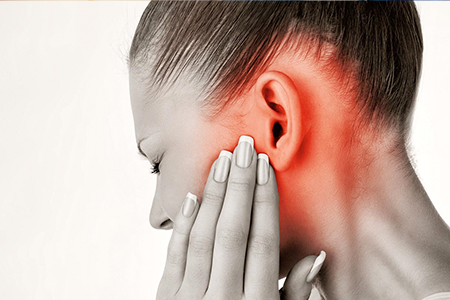
The sneezing and coughing caused by a runny nose may be uncomfortable, but when your common cold is causing an earache, the pain can go from uncomfortable to unbearable. The feeling of an earache caused by a common cold can feel dull, sharp, or burning, and this can be located inside or around the ear. It’s common to feel like your head and ears are stuffy. Earaches are especially common in children.
The common cold can cause an earache for one of three reasons:
- Congestion – If you suffer from a cold, mucus and fluid from your sinuses can build up in the tubes in your ears. This would explain why your ears feel full when you are experiencing an earache.
- Middle Ear Infection – The virus from a cold can cause a fluid buildup in your ear, and viruses can form in this fluid. This causes an ear infection, otherwise known as acute otitis media.
- Sinus Infection – A sinus infection occurs when your cold goes untreated and your sinuses become inflamed.
An earache in Los Angeles can make it difficult to concentrate and even sleep, so it’s essential to start treating it as soon as the pain starts.
You don’t always have the finances or time to visit an ear specialist in Los Angeles, so the ENT doctors in Los Angeles of Westside Head & Neck have compiled a list of simple home remedies for ear pain due to congestion and head colds.
- Hot or Cold Compress
Applying heat or ice to the inflamed ear can relieve the pain. Some may find one temperature better than the other, so alternating between hot and cold every twenty minutes will produce the best effects.
- Rest
Sleep improves your immune system, so getting a good night’s sleep may increase your body’s ability to fight off the infection.
- Sleep Position
If your ear inflammation is bad enough to affect your sleep schedule, you may find relief from switching your sleep position. Sleeping on the side opposite of the affected ear will help you sleep more soundly and release some of the pressure in your ear in the morning. You can also reduce pressure by sleeping propped up on two or more pillows.
- Hydration
As water makes up 60% of your body, hydrating yourself is always a good idea. Being hydrated will also help the mucus that is clogging up your systems loosen up and pass through. You may find it helpful to buy a large water bottle to keep with you at all times.
- Eardrops
Many people find that eardrops provide relief when it comes to an inflamed earache or ear infection. Eardrops can be prescribed or bought off the shelf at the grocery store. Olive oil is a popular home substitute for ear drops, but there is not enough scientific evidence to officially list this topic, so please proceed with caution.Keep in mind that you should not use ear drops on a child with tubes in their ears or whose eardrum has ruptured.
- Massage
Ear pain can radiate through the jaw, teeth, and neck. Try massaging behind the ears and down the neck using a circular motion with a moderate amount of pressure. Work forward to the front of the ears and jaw area while continuing with the downward, but firm, massaging motion.
- Over-the-Counter Medication
Your ENT specialist in LA may prescribe you an over-the-counter medication to help with your earache. These may include decongestants that will relieve the swelling that causes the pain of an earache; however, a decongestant won’t fix the initial cause of the earache.Non-steroidal anti-inflammatory drugs can also temporarily reduce your earache, but they won’t take it away for good. Common anti-inflammatory medications you can find at the grocery store are ibuprofen, aspirin, and acetaminophen. Keep in mind that you should not let babies or young children have aspirin.
If Your Ear Pain Persists
If your cold has passed but your ear is still hurting, it’s possible that your earache is caused by an ear infection. Most ear infections are bacterial, not viral. An ear infection occurs when the air-filled pocket behind the eardrum becomes infected and inflamed, thus filling with fluid.
Those experiencing an ear infection will experience a sudden onset of symptoms, including drainage from the ear, dizziness, and trouble hearing, and those who frequently experience ear infections should consult an otitis media specialist in Los Angeles. A Los Angeles ENT for ear infections will be able to give specialized treatment to your ear infection which may include over-the-counter medication or surgery.


